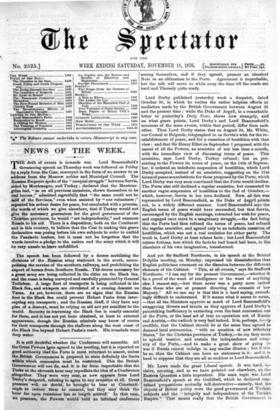Lord Derby published yesterday week a despatch, dated October 30,
in which he recites the rather helpless efforts at mediation made by the British Government between August 24 and the present time ; while the Duke of Argyll, in a remarkable letter to yesterday's Daily .News, shows how strangely, and on what grave points, Lord Derby's and Lord Beaconsfield's accounts of the same events, within that period, differ from each other. Thus Lord Derby states that on August 24, Mr. White, our Consul at Belgrade, telegraphed to us Servia's wish for the re- establishment of peace, and for :a cessation of hostilities with that view ; and that Sir Henry Elliot on September 1 proposed, with tha assent of all the Powers, an armistice of not less than a month, with the immediate view of discussing terms of peace. This armistice, says Lord Derby, Turkey refused ; but on pre- senting to the Powers its terms of peace, on the 14th of Septem- ber, it ordered an indefinite suspension of hostilities, which Lord Derby accepted, instead of an armistice, suggesting on the 21st terms of peace as a substitute for those proposed by the Porte, which Lord Derby was very soon convinced that the Porte would decline. The Porte also still declined a regular armistice, but consented to another vague suspension of hostilities to the 2nd of October,— which, however, Servia in her turn declined. Now, all this was represented by Lord Beaconsfield, as the Duke of Argyll points out, in a widely different manner. Lord Beaconsfield says the English terms of peace would have succeeded, but that Servia, encouraged by the English meetings, retracted her wish for peace, and engaged once more in a sanguinary struggle,—the fact being that the Porte had then refused the terms of peace, had refused the regular armistice, and agreed only to an indefinite cessation of hostilities, which was not a real armistice for either party. The truth is, Lord Derby at least relates facts ; but Lord Beaconsfield relates fictions, into which the facts he had heard had been, in the chambers of his own imagination, transformed.






































